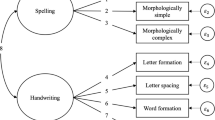Abstract
We compared the effects of two self-correction procedures on the spelling performance of 5 elementary school students with learning disabilities. Previous studies consistently have demonstrated self-correction to be more effective than “traditional” approaches to spelling instruction. However, we could find no single-subject design experiments analyzing the procedural details of how or when self-correction should be conducted to be most effective. For 4 days each week students practiced a list of 20 spelling words by listening to an audiotape on which the weekly list was dictated and writing the words. For half of each week's words, students checked and self-corrected after attempting each word; for the other half of the list, the students self-corrected after attempting all 10 words. An alternating treatments design showed self-correction after each word to be more effective for acquisition of new spelling words as measured by end-of-the-week tests for all 5 students, and maintenance of previously studied spelling words as measured by 1-week maintenance tests for 4 of the 5 students.
Similar content being viewed by others
REFERENCES
Barbetta, P. M., Heron, T. E., & Heward, W. L. (1993). Effects of active student response during error correction on the acquisition, maintenance, and generalization of sight words by students with developmental disabilities. Journal of Applied Behavior Analysis, 26, 111–119.
Barbetta, P. M., & Heward, W. L. (1993). Effects of active student response during error correction on the acquisition and maintenance of geography facts by elementary students with learning disabilities. Journal of Behavioral Education, 3, 217–233.
Barbetta, P. M., Heward, W. L., & Bradley, D. M. (1993). Relative effects of whole-word and phonetic-prompt error correction on the acquisition and maintenance of sight words by students with developmental disabilities. Journal of Applied Behavior Analysis, 26, 99–110.
Barbetta, P. M., Heward, W. L., Bradley, D. M., & Miller, A. D. (1994). Effects of immediate and delayed error correction on the acquisition and maintenance of sight words by students with developmental disabilities. Journal of Applied Behavior Analysis, 27, 177–178.
Carnine, D. W. (1980). Phonics versus whole-word correction procedures following phonics instruction. Education and Treatment of Children, 3(4), 323–330.
Cooper, J. O., Heron, T. E. & Heward, W. L. (1987). Applied behavior analysis. Upper Saddle River, NJ: Prentice Hall/Merrill.
Dalrymple, A. J., & Feldman, M. A. (1992). Effects of reinforced directed rehearsal on expressive sign language learning by persons with mental retardation. Journal of Behavioral Education, 2, 1–16.
Drevno, G. E., Kimball, J. W., Possi, M. K., Heward, W. L., Gardner III, R., & Barbetta, P. M. (1994). Effects of active student response during error correction on the acquisition, maintenance, and generalization of science vocabulary by elementary students: A systematic replication. Journal of Applied Behavior Analysis, 27, 179–180.
Espin, C. A., & Deno, S. L. (1989). The effects of modeling and prompting feedback strategies on sight word reading of students labeled learning disabled. Education and Treatment of Children, 12, 219–231.
Grskovic, J. A., & Belfiore, P. J. (1996). Improving spelling performance of students with disabilities. Journal of Behavioral Education, 6, 343–353.
Harward, S. V., Allred, R. A., & Sudweeks, R. R. (1994). The effectiveness of four self-corrected spelling test methods. Reading Psychology: An International Quarterly, 15, 245–271.
Heron, T. E., Heward, W. L., Cooke, N. L., & Hill, D. S. (1983). Evaluation of a classwide peer tutoring system: First graders teach each other sight words. Education & Treatment of Children, 6, 137–152.
Heron, T. E., Okyere, B. A., & Miller, A. D. (1991). A taxonomy of approaches to teach spelling. Journal of Behavioral Education, 1, 117–130.
Heward, W. L. (1994). Three “low-tech” strategies for increasing the frequency of active student response during group instruction. In R. Gardner III, D. M. Sainato, J. O. Cooper, T. E. Heron, W. L. Heward, J. Eshleman, & T. A. Grossi (Eds.), Behavior analysis in education: Focus on measurably superior instruction (pp. 283–320). Pacific Grove, CA: Brooks/Cole.
Kleinman, D., Heckaman, K. A., Kimball, J. W., Possi, M. K., Grossi, T. A., & Heward, W. L. (May, 1994). A comparative analysis of two forms of delayed feedback on the acquisition. generalization, and maintenance of science vocabulary by elementary students with learning disabilities. Poster presented at the 20th Annual Convention, Association for Behavior Analysis, Atlanta, GA.
Larsen, S. C., & Hammill, D. D. (1994). Test of Written Spelling. Austin, TX: Pro-Ed.
McGuffin, M. E., Martz, S. A., & Heron, T. E. (1997). The effects of self-correction versus traditional spelling on the spelling performance and maintenance of third grade students. Journal of Behavioral Education, 7, 463–476.
McNeish, J., Heron, T. E., & Okyere, B. A. (1992). Effects of self-correction on the spelling performance of junior high students with learning disabilities. Journal of Behavior Education, 2, 17–27.
Okyere, B. A., Heron, T. E., & Goddard, Y. (1997). Effects of self-correction on the acquisition, maintenance, and generalization of the written spelling of elementary school children. Journal of Behavioral Education, 7, 51–69.
Van Houten, R. (1980). Learning through feedback: A systematic approach for improving academic performance. New York: Human Sciences Press.
Vargas, A. U., Grskovic, J. A., Belfiore, P. J., & Halbert-Ayala, J. (1997). Improving migrant students' spelling of English and Spanish words with error correction. Journal of Behavioral Education, 7, 13–23.
Wechsler, D. (1974). Wechsler Intelligence Scale for Children—Revised. New York: Psychological Corp.
Wirtz, C. L., Gardner III, R., Weber, K., & Bullara, D. (1996). Using self-correction to improve the spelling performance of low-achieving third graders. Remedial and Special Education, 17, 48–58.
Author information
Authors and Affiliations
Rights and permissions
About this article
Cite this article
Morton, W.L., Heward, W.L. & Alber, S.R. When to Self-Correct?: A Comparison of Two Procedures on Spelling Performance. Journal of Behavioral Education 8, 321–335 (1998). https://doi.org/10.1023/A:1022871230565
Issue Date:
DOI: https://doi.org/10.1023/A:1022871230565




